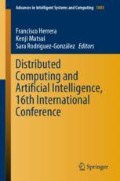Abstract
Due to the rapid evolution of society, citizens are constantly being pressured to obtain new skills through training. The need for qualified people has grown exponentially, which means that the resources for education/training are significantly more limited, so it’s necessary to create systems that can solved this problem. The implementation of Intelligent Tutoring Systems (ITS) can be one solution. Besides, ITS aims to enable users to acquire knowledge and develop skills in a specific field. To achieve this goal, the ITS should learn how to react to the actions and needs of the users, and this should be achieved in a non-intrusive and transparent way. In order to provide personalized and adapted system, it is necessary to know the preferences and habits of users. Thus, the ability to learn patterns of behaviour becomes an essential aspect for the successful implementation of an ITS. In this article, we present the student model of an ITS, in order to monitor the user’s biometric behaviour and their learning style during e-learning activities. In addition, a machine learning categorization model is presented that oversees student activity during the session. Additionally, this article highlights the main biometric behavioural variations for each activity, making these attributes enable the development of machine learning classifiers to predict users’ learning preferences. These results can be instrumental in improving ITS systems in e-learning environments and predict user behaviour based on their interaction with computers or other devices.
Access this chapter
Tax calculation will be finalised at checkout
Purchases are for personal use only
References
O’Donnell, E., Lawless, S., Sharp, M., Wade, V.P.: A review of personalised e-learning: towards supporting learner diversity. Int. J. Distance Educ. Technol. (IJDET) 13(1), 22–47 (2015)
Cataldi, Z., Lage, F.J.: Sistemas tutores inteligentes orientados a la enseñanza para la comprensión. Edutec. Revista Electrónica de Tecnología Educativa 0(28), 108 (2009). https://doi.org/10.21556/edutec.2009.28.456
Ahuja, N.J., Sille, R.: A critical review of development of intelligent tutoring systems: retrospect, present and prospect. Int. J. Comput. Sci. Issues (IJCSI) 10(4), 39 (2013)
Brusilovsky, P., Peylo, C.: Adaptive and intelligent webbased educational systems. Int. J. Artif. Intell. Educ. 13(2–4), 159–172 (2003). http://dl.acm.org/citation.cfm?id=1434845.1434847. ISSN 1560-4292
Rodrigues, M., Novais, P., Santos, M.: Future challenges in intelligent tutoring systems – famework, recent research developments in learning technologies. In: Méndez Villas, A., Gonzalez Pereira, B., Mesa González, J., Mesa González, J.A. (eds.) Proceedings of the 3rd International Conference on multimedia and Information & Communication Technologies in Education, pp. 929–934. Publishers Formatex (2005)
Picard, R., Papert, S., Bender, W., Blumberg, B.: Affective learning - a manifesto. BT Technol. J. 22(4), 253–268 (2004)
Lee, H., Choi, Y., Lee, S., Park, I.: Towards unobtrusive emotion recognition for affective social communication. In: The 9th Annual IEEE Consumer Communications and Networking Conference - Special Session Affective Computing for Future Consumer Electronics. IEEE, Las Vegas (2012)
Pang, B., Lee, L.: Opinion mining and sentiment analysis. Found. Trends® Inf. Retrieval 1(2), 91–231 (2006)
Ortony, A., Clore, G., Collins, A.: The Cognitive Structure of Emotions. Cambridge Press, Cambridge (1990)
Monrose, F., Rubin, A.: Keystroke dynamics as a biometric for authentication. Future Gener. Comput. Syst. 16(4), 351–359 (2000)
Araújo, L.C., Sucupira, L.H., Lizarraga, M.G., Ling, L.L., Yabu-Uti, J.B.: User authentication through typing biometrics features. IEEE Trans. Sig. Process. 53(2), 851–855 (2005)
Carneiro, D., Novais, P., Pêgo, J., Sousa, N., Neves, J.: Using mouse dynamics to assess during online exams. Hybrid Artif. Intell. Syst. 9121, 345–356 (2015)
Pimenta, A., Gonçalves, S., Carneiro, D., Riverola, F., Novais, P.: Mental workload management as a tool in e-learning scenarios. In: B-Peces, Paillet, O., Ahrens, A. (eds.) Proceedings of the 5th International Conference on Pervasive and Embedded Computing and Communication Systems, pp. 25–32. Scite Press (2015)
Mancas, M.: Attention in computer science - part 1. News and insights from EAI community – Blog, 6 October 2015. http://blog.eai.eu/attention-in-computer-science-part-1/. Accessed 31 Dec 2016
Toala, R., Gonçalves, F., Durães, D., Novais, P.: Adaptive and intelligent mentoring to increase user attentiveness in learning activities. In: Simari, G., Fermé, E., Gutiérrez Segura, F., Rodríguez Melquiades, J. (eds.) Advances in Artificial Intelligence - IBERAMIA 2018. IBERAMIA 2018. Lecture Notes in Computer Science, vol. 11238. Springer, Cham (2018)
Andrade, F., Novais, P., Carneiro, D., Zeleznikow, J., Neves, J.: Using BATNAs and WATNAs in online dispute resolution. In: Nakakoji, K., Murakami, Y., McCready, E. (eds.) New Frontiers in Artificial Intelligence, JSAI-isAI 2009. Lecture Notes in Computer Science, vol. 6284. Springer (2010). http://dx.doi.org/10.1007/978-3-642-14888-0_2
Acknowledgement
This work has been supported by FCT – Fundação para a Ciência e Tecnologia within the Project Scope: UID/CEC/00319/2019.
Author information
Authors and Affiliations
Corresponding author
Editor information
Editors and Affiliations
Rights and permissions
Copyright information
© 2020 Springer Nature Switzerland AG
About this paper
Cite this paper
Toala, R., Durães, D., Novais, P. (2020). Human-Computer Interaction in Intelligent Tutoring Systems. In: Herrera, F., Matsui , K., Rodríguez-González, S. (eds) Distributed Computing and Artificial Intelligence, 16th International Conference. DCAI 2019. Advances in Intelligent Systems and Computing, vol 1003 . Springer, Cham. https://doi.org/10.1007/978-3-030-23887-2_7
Download citation
DOI: https://doi.org/10.1007/978-3-030-23887-2_7
Published:
Publisher Name: Springer, Cham
Print ISBN: 978-3-030-23886-5
Online ISBN: 978-3-030-23887-2
eBook Packages: Intelligent Technologies and RoboticsIntelligent Technologies and Robotics (R0)

